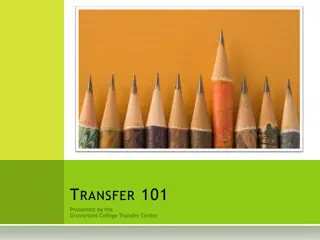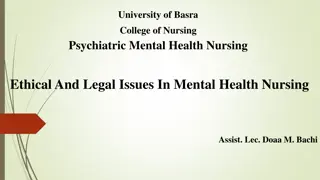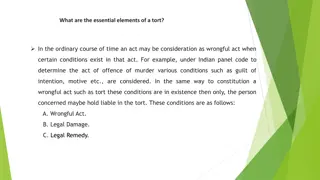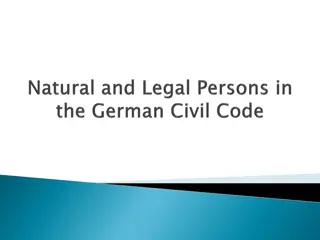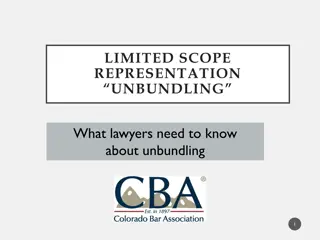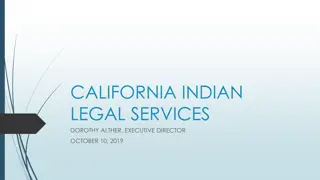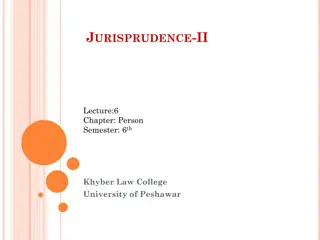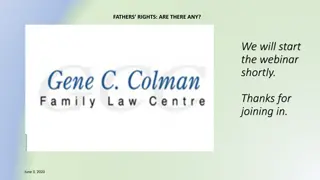Legal Rights and Options for Regional Center Clients in California
This document discusses the legal rights and options available for adult regional center clients in California, focusing on clarifying their rights, reviewing support systems, exploring alternatives to conservatorship, and explaining the conservatorship process. It also covers children's and adults' rights, particularly emphasizing the rights of adult regional center clients under the Lanterman Act. The Act ensures these clients have the same legal rights and responsibilities as other individuals, including the right to treatment, habilitation services, and making choices in their lives.
Download Presentation

Please find below an Image/Link to download the presentation.
The content on the website is provided AS IS for your information and personal use only. It may not be sold, licensed, or shared on other websites without obtaining consent from the author. Download presentation by click this link. If you encounter any issues during the download, it is possible that the publisher has removed the file from their server.
E N D
Presentation Transcript
Alta California Regional Center Legal Options for Adult Regional Center Clients June 2019 Robin Black, Legal Services Manager Sami Elamad, Legal Services Specialist
Purpose of this Workshop Clarify legal rights of adult regional center clients Review available supports and arrangements to help meet client s legal decision-making needs, including alternatives to conservatorship: Provide an overview of the conservatorship process for regional center clients Answer questions regarding legal options for adult clients
Childrens Rights -- under age 18 Food, clothing, shelter Health care and needed services Education & Special Education Participate in programs Play and Recreation Safety and special protection Opportunity for growth/development Right to juvenile justice system Have his/her wishes considered Due process Right to work limited Emancipation Right to refuse some medical trmt. Routine medical care (age 15+)
Adults Rights -- age 18 and up Vote Join the military Donate blood/organs Work full time Play the lottery Obtain special driving permits Drive late at night Consent to sexual relations Establish chkg/savings acct Apply for loans, credit cards File a lawsuit Get married, adopt Move out of parents home Purchase home, vehicle Religious participation of choice Give/refuse medical consent Smoke/drink/gamble (21 in CA)
Adult RC Clients Rights (Lanterman Act) the same legal rights and responsibilities guaranteed all other individuals by the United States Constitution and laws and the Constitution and laws of the State of California.) (WIC 4502(a).) A right to treatment and habilitation services and supports in the least restrictive environment. Treatment and habilitation supports should foster the developmental potential of the person and be directed toward the achievement of the most independent, productive, and normal lives possible. Such services shall protect the personal liberty of the individual and shall be provided with the least restrictive conditions necessary to achieve the purposes of the treatment, services, or supports . (WIC 4502(b).) A right to make choices in their own lives, including, but not limited, where and with whom they live, their relationships with people in their community, the way they spend their time, including education, employment, and leisure, the pursuit of their personal future, and program planning and implementation. (WIC 4502(j).)
Legal Capacity to Make Decisions (Probate Code) Capacity: ability to understand the nature and consequences of a decision and to make and communicate a decision, and includes in the case of proposed health care, the ability to understand its significant benefits, risks, and alternatives. (Prob. 4609.) All persons have capacity to make decisions/be responsible for their acts/decisions unless a court has found otherwise. (Prob. 810(a).) Thus, the existence of a developmental disability does not inherently mean that a person lacks capacity. A person with a disability may still be capable of making decisions including contracting, marrying, making medical decisions, and performing other actions. (Prob. 810(b).)
Summary: Adult Clients Rights Adults with developmental disabilities retain their rights to make decisions, unless removed by court, and should be supported to make choices/decisions in their lives to the greatest extent possible!
Key Considerations for Supporting Adult Clients in Decision-Making Client understanding and consent Needs-based rather than automatic Least restrictive option, preserves rights Promoting independence and self-sufficiency Flexibility, Revocability, Accountability Ease & Cost
Legal Options to Assist Adult Clients With Financial Decision-Making Representative Payeeship ILS or SLS services targeting with budgeting CalABLE accounts Financial Power of Attorney Special Needs Trust Conservatorship of the Estate
Services/Supports Multiple resources exist to provide training and support regarding making purchases and budgeting, including but not limited to: School transition programs (18-22) RC day programs (22+) RC Independent Living Skills (ILS) training; and RC Supported Living Skills training Trust management agency/representative payee
Representative Payeeship A person or organization appointed to receive an individual s Social Security or SSI benefits, or other income For individuals who can t direct or manage their own benefits Payee uses benefits to pay for current and future needs and properly save remainder Keeps records of expenses and provides accounting to Social Security ACRC can pay for an agency to serve as represenative payee for a client!
Cal-ABLE Accounts Client can save money without affecting eligibility for public benefits such as SSI, IHSS, and Medi-Cal. Can contribute up to $15,000 per year Contributions and withdrawals for qualified expenses tax-free Expenses which help maintain or improve client health, independence, or qualify of life. Account can be opened/managed by an authorized legal representative, so long as the client agrees Opened/managed by client s authorized legal representative Can serve as both savings and checking account
Financial Power of Attorney Client appoints an individual to handle financial matters Bank accounts Real property Right to file legal actions Standard forms online and free Client must understand and consent CAVEAT: risk of financial abuse?
Special Needs Trust (SNT) Permits disabled person to maintain eligibility for public assistance benefits like SSI, IHSS, and Medi-Cal Client assets (cash, real or personal property) are placed in trust to protect them from being considered as resources by public benefit systems Funds in trusts can pay for any item not available through public benefits, e.g., clothing, Internet, furniture, vacations, or supplemental care, medical expenses not covered by insurance). Usually require attorney assistance to set up
Conservatorship of Estate When individual is unable to manage their financial assets, conservator may be appointed to do so Only for those with financial assets: e.g., real property, bank accounts, business, financial investments Conservator may locate, take control of and manage assets, make investments, collect rental or interest income, protect assets. NOT REQUIRED FOR MANAGEMENT OF CLIENT WAGES OR BENEFITS INCOME!
Legal Options to Assist Adult Clients With Personal Decision-Making RC Planning Team & Services/Supports Assignment of Educational Decision Making Rights Power of Attorney for Health Care/Advance Directive Regional Center Medical Consent Written Consent to Access Confidential Records Supported Decision-Making Agreements Conservatorship of the Person
RC Planning Team Process SC & Supervisor ACRC specialty staff: psychologists, physicians, transportation, resource development, legal Service providers Service and support options Members problem solve options to meet client needs!
Assignment of Educational Decision-Making Rights Adult 18-21 still in ed system Authorizes parents to make educational decisions only Client must understand and consent Standard form: Assignment of Educational Decision-Making Authority free! (Cal. Edu. Code section 56014.5)
Health Care Power of Attorney/ Advance Directive Client appoints medical decision maker Cannot force treatment on client against will Free/low cost--forms are free online Revocable CAVEAT: Not all MDs will accept
Regional Center Medical Consent RCs are authorized to consent to surgical, medical & dental treatment Adult clients without capacity to give consent, or when RC cannot reach conservator No blanket consent; only for specific treatments as needed (Welf. & Inst. Code section 4655.)
Written Consent to Access Confidential Records HIPAA-compliant release forms signed by client Allow presence of others at medical appointments, review of medical records, regional center records, educational or other records, etc. Allows informed assistance of client regarding decision- making Client s SC can provide a blank consent form!
Supported Decision-Making (SDM) Allows individuals with disabilities to retain decision- making ability by choosing individuals to help them make choices Friends, family members, professionals, trusted advisors may be selected Supporters agree to help person with disability consider and communicate decisions, and give person tools to make their own informed decisions (supporters do NOT make the decisions in place of the individual) Many individuals and families already practice SDM! Do you?
Conservatorship Legal process where court removes and/or limits a person s civil rights, and gives the rights to another person/s Goal of ensuring individuals basic needs are met and protecting income or assets from fraud and mismanagement
Types of Conservatorship Limited - In California, this applies ONLY to Persons with Developmental Disabilities* General Originally designated for protection of the elderly with dementia/Alzheimer s Lanterman-Petris-Short (LPS) Grave or Serious Mental Disability or Substance Abuse problem; not a Developmental Disability
What Conservatorship Can Do: Allow someone to secure a conservatee s living situation, health care, meals, clothing, personal, care, housekeeping, transportation, recreation, and needed services when client is unable to do so. Potentially protect client from legal consequences of some actions (e.g., inadvisable contracts, marriages) Potentially prevent fraud, abuse and neglect by controlling client contacts with identified individuals who have used undue influence to cause harm.
What Conservatorship cannot do Control behavior (client s or others ) Restrict freedom of movement Force participation in activitiesor socialization with specific individuals against one s will Deny access to services and opportunities Isolate someone from others Medicate someone against their will Place someone in a locked facility
1. Limited Conservatorship Less restrictive Seven specific powers may be granted by court: Power to fix residence Power to make educational decisions Power to determine social/sexual contacts Power to decide whom/if to marry Power to consent to medical treatment Power to enter into contracts Power to access confidential records Court decides: may grant any, all, or none All other rights retained
Limited Conservatorship Court finds individual lacks the capacity to perform some, but not all, tasks needed to provide properly for his or her own personal need for physical health, food, clothing, or shelter. (Prob. 1828.5(c).) Client s wishes should be respected to greatest extent possible Only used as necessary and in areas where there is demonstrated need NOTE: By law, must be used to help encourage to have the most typical, independent, and productive life possible
2. General Conservatorship Who: Generally, those with dementia OR severe/profound intellectual disability AND/OR severe mental health disorder) unable to express desires or make choices considered incompetent in a criminal proceeding Conservatee loses most civil rights to give consent more restrictive
General Conservatorship-- Rights Retained The right to receive visitors, telephone calls, and personal mail, unless specifically limited by court order. (Prob. 2351(a).) Right to vote, marry, unless specifically limited or removed by court order (this is very common)
Limited AND General Conservatorship Rights Retained To be treated with understanding and respect To participate in decisions regarding his/her life and have his/her wishes considered Ask questions and express concerns and complaints re conservator/ship Representation by a lawyer Request court replace conservator or end conservatorship Make or change his/her will Directly receive and control his/her own salary/wages Control an allowance (spending money court authorizes) Enter into transactions to provide for the necessities of life and for minor children and spouse/domestic partner
3. LPS Conservatorship Lanterman-Petris-Short mental health conservatorship Most restrictive Person who is gravely disabled as a result of mental disorder or impairment by chronic alcoholism" when that person is unwilling or unable to accept treatment voluntarily (WIC 5350, 5352.) Permit placement in residential facility, forced psychotropic medications and treatment treatment Temporary: 1 year or less can be renewed annually Usually through county Public Guardian s office
Steps to Obtain Conservatorship (General or Limited) Person seeking to be conservator files documents with court, sends copies to family members, Regional Center Court investigator does interviews == files report Court-appointed attorney for client interviews == files report (usually only for Limited) Regional Center == report/recommendations Court hearing or hearings Order and Letters of Conservatorship issued (if granted)
Regional Center Conservatorship Review Review petition Review client records Interview petitioners & client Multidisciplinary team review, discussion and recommendations File report/recommendations with court; provides copies to petitioners and client Ongoing informal monitoring of conservatorship
Resources on Legal Decision-Making Legal Decision/Alternatives to Conservatorship: https://www.courts.ca.gov/documents/BTB23_FRI_Expanding_4.pdf Conservatorship: https://courts.ca.gov/selfhelp-conservatorship.htm https://www.disabilityrightsca.org/publications/conservatorship-rights https://www.courts.ca.gov/documents/handbook.pdf Supported Decision Making http://www.supporteddecisionmaking.org/sites/default/files/supported- decision-making-frequently-asked-questions.pdf https://thearcca.org/info-resources/supported-decision-making/





